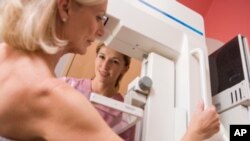In a significant and controversial shift, an influential U.S. medical association has urged women to wait until age 45 before beginning annual mammogram screenings for breast cancer.
The American Cancer Society, which had for years taken an aggressive approach to screening, previously recommended that women with an average risk of breast cancer be checked each year from age 40. But the group has now changed its advice because evidence failed to show enough lives were being saved.
In addition, the cancer organization is urging women over 55 to switch to having mammograms every two years, instead of annually.
"Since the last American Cancer Society breast cancer screening update for average-risk women was published in 2003, new evidence has accumulated from long-term follow-up of randomized controlled trials and observational studies," according to a report from the ACS, published Tuesday in the Journal of the American Medical Association.
The new guidelines fall more closely in line with those from the U.S. Preventive Services Task Force, a government-backed panel of independent experts that recommends biennial breast cancer screening starting at age 50 for most women.
"The evidence clearly shows that there is substantial magnitude of benefit, life saved, [with the revised guidelines] compared to the risks of having a false-positive biopsy, false-positive additional images or overdiagnosis,” said Dr. Kevin Oeffinger. The primary care doctor at Memorial Sloan Kettering Cancer Center in New York chaired the panel that crafted the new ACS guidelines.
But not all women, among them breast cancer survivors, are on board.
"As a seven-year breast cancer survivor, it saddens me to hear of the changes proposed by the American Cancer Society," said Liz Buscema, 40. "Early detection is the key to catching breast cancer in its early stages."
Buscema, who lives in West Virginia, was 33 when she discovered her lump. She said that since then, she's met numerous women who were diagnosed with breast cancer in their 20s and early 30s, most of whom had no family history of cancer.
"These women would have never given cancer a second thought had it not been for monthly self-checks and annual breast exams from their doctors. I urge all women to continue self-exams and to be your own health advocate," Buscema said.
Other outcomes
Stephanie Bernik, chief of surgical oncology at New York's Lenox Hill Hospital, agreed, characterizing the new guidelines as "disappointing."
"Although the recommendations are based on scientific studies, most of the studies only look at survival as the only important outcome," Bernik said. "They fail to address the fact that women with smaller tumors often need less treatment."
The American Cancer Society did leave substanial room for personal preference in its new guidelines.
While the association no longer recommends annual mammograms for 40- to 44-year-olds, it said those women should still "have the opportunity" to get tested if they choose to, and that women over 55 should be able to continue screening once a year.
"You see this moving from a one-size-fits-all approach to something that’s more personalized and more individualized, which is where medicine is going," said Oeffinger.
In response to the new guidelines, the U.S. Preventive Services Task Force said in a statement that it would "examine the evidence" presented by the American Cancer Society as it finalizes its recommendations.





